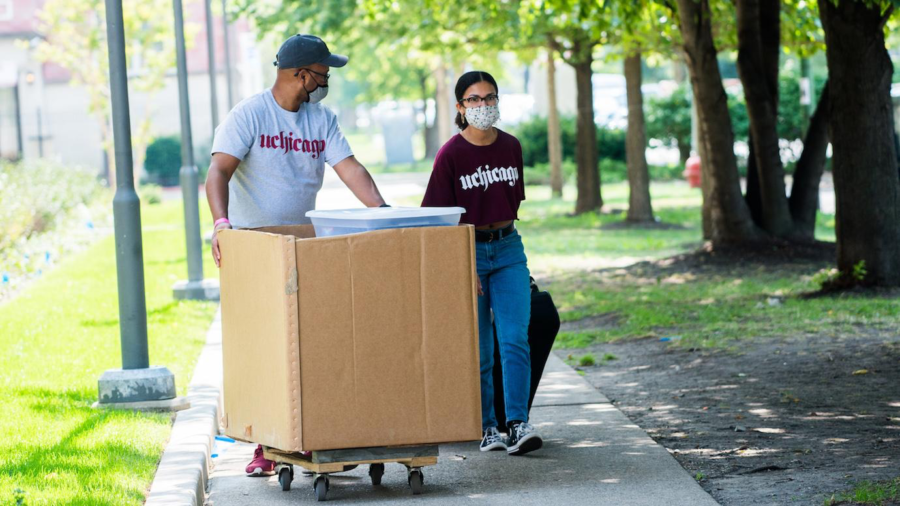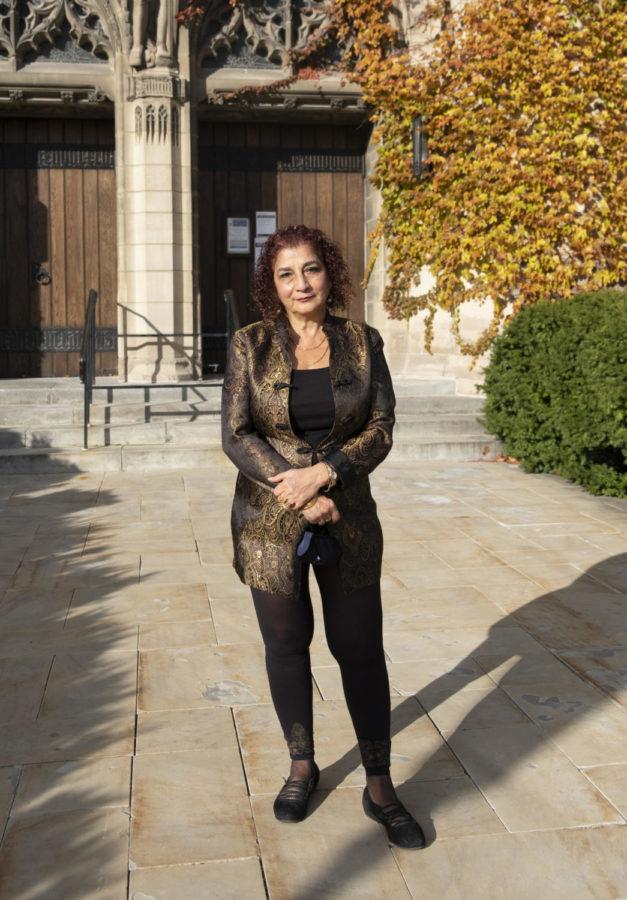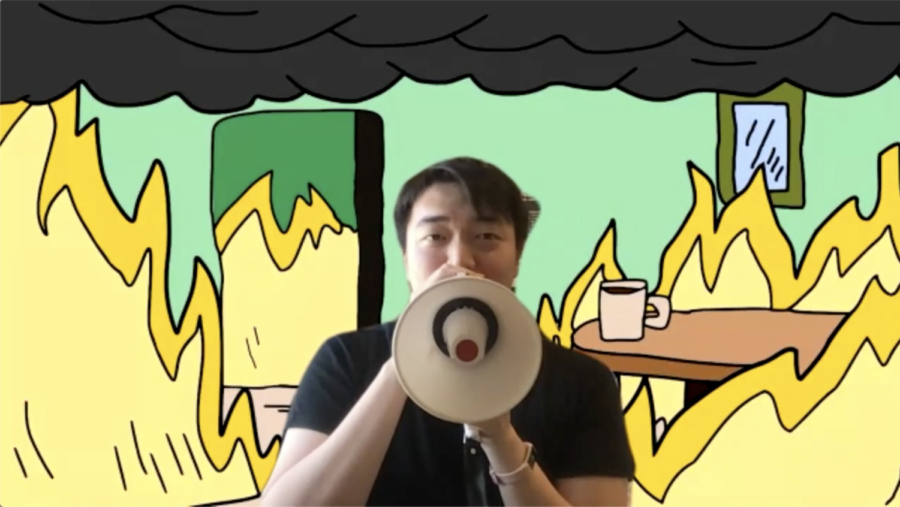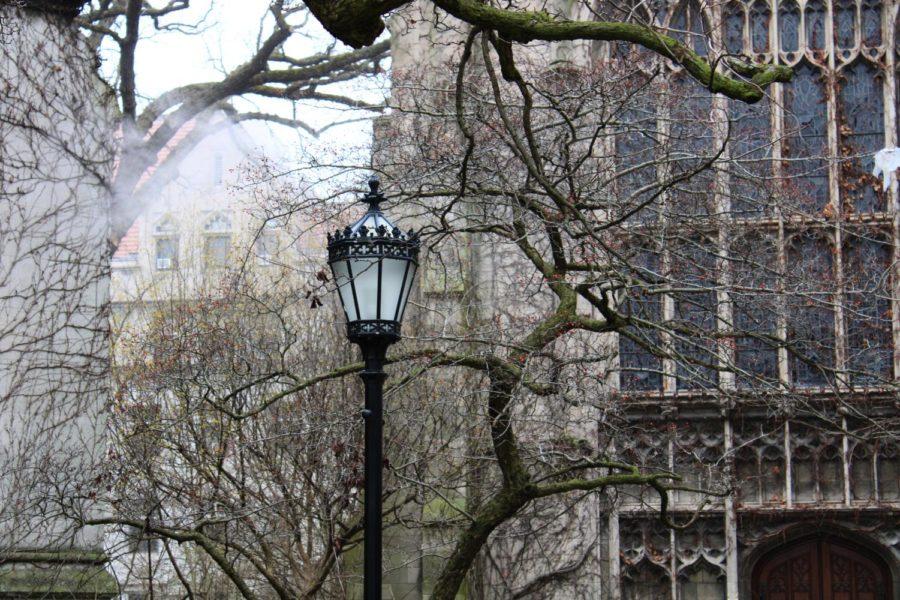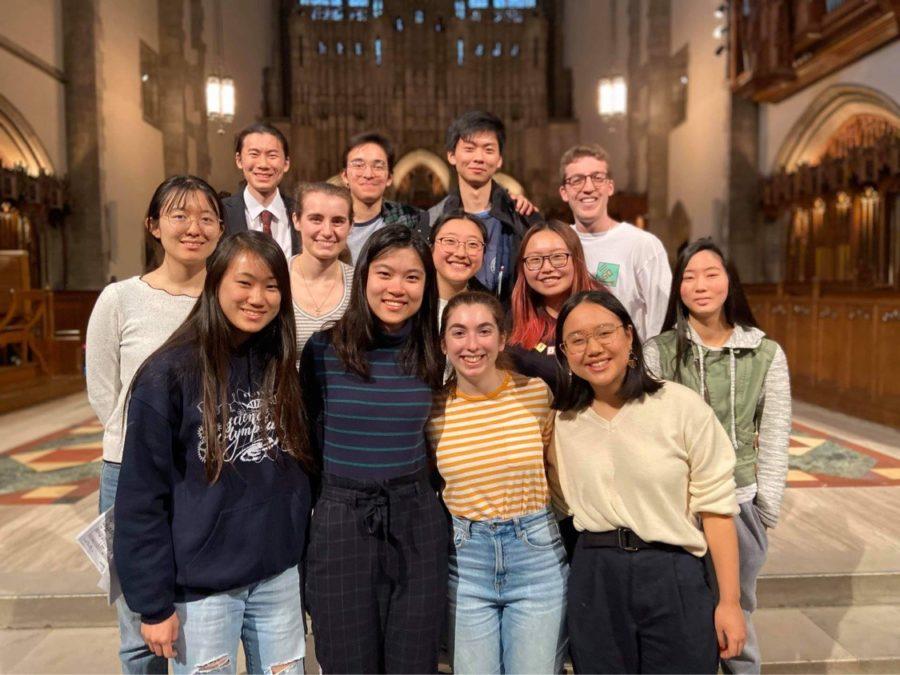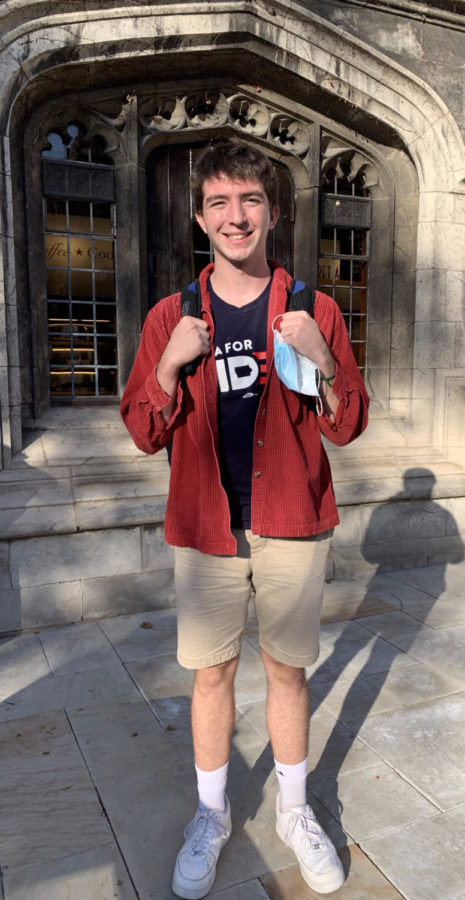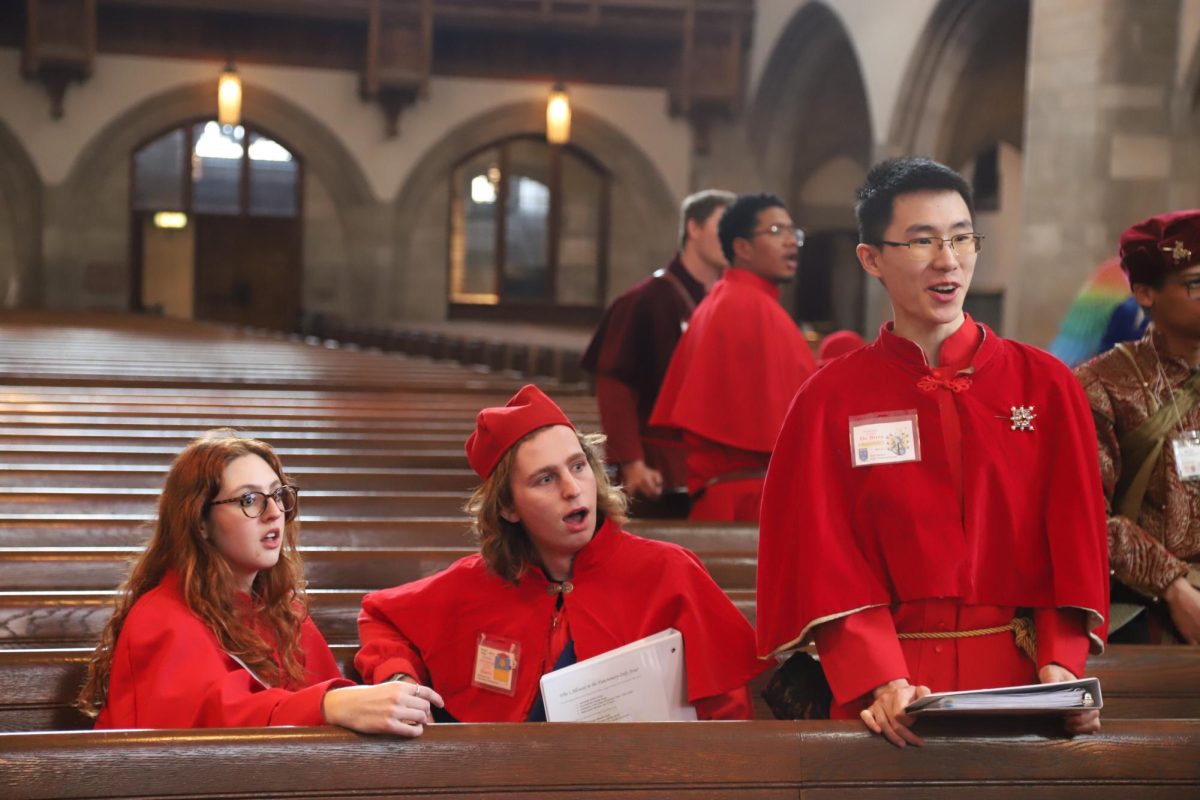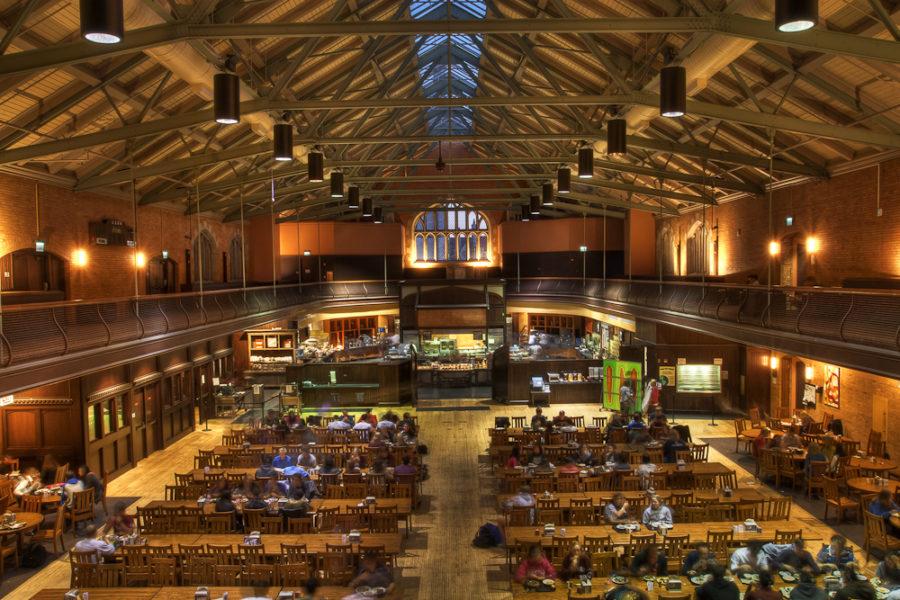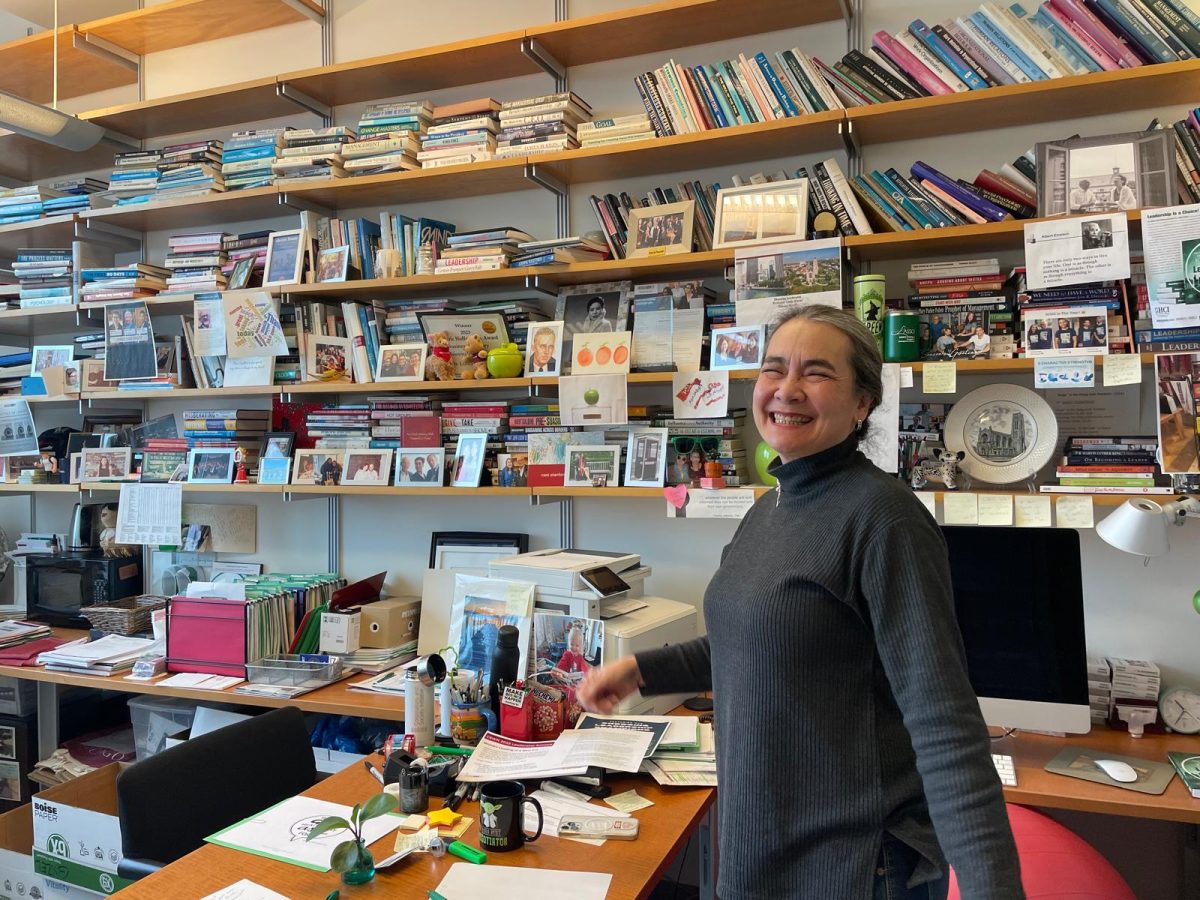In a year filled with upsets and uncertainty, it might be hard at first glance to find what connects the Class of 2024, who for their first quarter in college have been separated from each other by great distances and time zones. Yet, the class’s common thread is conveyed in the experiences of the students either on or off-campus, here in Chicago or abroad, and how they’ve created an especially unique first quarter of college.
One of the few traditions of years past that did remain undisturbed for the class of 2024 was the culmination of their hard work for the past four years of high school: opening college decision letters.
First-year Themis Frigo is an international student from London who was accepted into UChicago Early Decision I. He was visiting family in Chicago when he got his decision.
“The first thing I did was that I called one of my friends who’s a second- year. And we Facetimed while I opened it, and we went crazy, because I live in London, she lives in Columbus, Ohio. And the acceptance letter meant that we were about to spend the next three years in person for the first time together, which was super sweet,” Frigo said.
With all the meticulous planning the University did in preparation for autumn quarter, Frigo knew the quarter would look different than expected, but also knew he wanted to come to campus and experience life as a college student in the U.S.
“I've lived in London my whole life, and it's a new chapter. For me moving to the U.S., I really wanted to come here and experience college. There was nothing I could really do if I stayed home. And I also wanted to meet all of these cool new people from all around the world who I also knew were coming to campus,” Frigo said.
Nikki Solanki was off-campus this quarter at her home in the Bay Area. When she got her acceptance letter in March, she did not think COVID-19 was going to affect her autumn quarter plans. But now, Solanki is wondering what the rest of her tumultuous first year will look like.
“I really thought we were going to open up. But now the second wave is hitting and I don't really know how we're going to handle it. And I do think that people are really tired of this pandemic. And so who knows if people are really going to follow the rules?” Solanki said.
Makayla MacGregor was on campus for autumn quarter, but has decided to move back to her home in Maine for the winter quarter. She was accepted Early Action as an Odyssey Scholar. MacGregor, like many students when they first heard the plans for a more restrictive autumn quarter, altered her expectations of what the fall would look like.
“I didn't want to get my hopes up for a social scene that we clearly weren't going to have this quarter. I know there's restrictions on campus from socializing, but obviously there's still ways that kids can connect indoors,” MacGregor said.
Felicia Pang was off-campus in her hometown of Shanghai, China, though she had a different off-campus experience than most. Pang and around 45 other students from the surrounding area have set up a “Zoom Center” at a hotel in Shanghai where they have access to facilities like study rooms and a gym to give distance learning a community feel.
Pang and other Chinese students who decided to study remotely for aAutumn aQuarter created the Zoom Center over a group text after the U.S. imposed strict travel restrictions on China. The students take classes, study, and live at the hotel “Zoom Center” much like students would at a UChicago residence hall. Yet, unlike on campus, students have roommates, allowing them to forge deeper connections with one another.
“I wake up at around nine and I stay in my room and read or do homework until 12 and go out for lunch. I eat lunch with other students at the Zoom Center and after we return, some of us would go to the study room to work together. At around six, we go out for dinner together. Sometimes I go to the gym with my roommate afterwards,” Pang said.
Though living in the “Zoom Center” has allowed these students to forge a community and make close friends while abroad, Pang wishes the University would have been more helpful to its foreign students.
“The University could have opened more class sessions that are convenient for foreign students at different time zones. At the same time, it would have been a much better college experience if UChicago collaborated with local schools for foreign students who cannot be on campus,” Pang said.
The summer before the start of autumn quarter was a confusing time for many. Awaiting information about UChicago’s fall plans, students and their families had to make difficult decisions about whether or not they would come to Chicago. Despite the uncertainty, members of the Class of 2024 were trying to connect with their peers as best they could online, despite their uncertainty about the near future.
“I really had to get over that awkward barrier of DM-ing people. Once you get over that, you're fine. I tried to talk to as many people as possible,” Solanki said.
The air of uncertainty for autumn quarter surrounded not just the students, but the University’s staff and administration as well. Michelle Rassmussen, Dean of Students in the University, explained how a group of administrators led by Richard Mason, Assistant Vice President for Campus Life, met almost every day over the summer, planning for students to return to campus. The group would come up with policies and consulted with infectious disease experts at UChicago Medicine and examined the City of Chicago guidelines before making a final decision.
“Social distancing is not conducive or compatible with what we typically think of as communal living. The whole purpose of our residential communities is to have people gathered together socially. All of those things do not work in a pandemic,” Rasmussen said.
“Intense planning went into everything from how to safely open and operate residence halls and dining halls to more minute details like bathrooms,” she said.
Rasmussen explained how density in the residence halls was driven by each hall’s number of communal bathrooms. The setup of a dorm’s bathrooms, which varied depending on the residence hall, determined how many students were allowed in each bathroom. The administrative team used recommendations from UChicago Medicine and came up with a ratio of three students per shower fixture. This ratio was able to determine the percentage of the normal capacity the University could safely accommodate students in the residence halls, which was around 59%.
The summer before autumn quarter, Pang, who was attending high school in Texas, decided to travel back to her family’s home in Shanghai as COVID-19 cases started to increase in the United States. She had to travel almost a day, making a stop in Germany, before arriving in China for a mandatory 14-day quarantine.
“I was scared because there was no one I could rely on during my journey back home. But once I stepped my feet on China, I felt secure again,” Pang said.
Concerned about the infection rates in the U.S. and the growing possibility of contracting COVID-19, Pang and her family made the difficult decision for her to stay home for the beginning of autumn quarter.
Anyone’s first day of school, whether starting first grade or freshman year, is filled with a poignant mix of excitement, worry, and anticipation. Yet, this fall seemed to be a more rougher adjustment than usual for the incoming class.
Though her expectations of autumn quarter had changed, MacGregor still felt the struggle of COVID-19’s impact her first few weeks, which she conveyed through her college move-in vlog.
MacGregor has been a vlogger on YouTube for about a year, sharing aspects of her life with her online audience. One of her more recent videos detailed her trip to UChicago then moving into her dorm with her parents. Though most of her video is happy and upbeat, towards the end the music shifts and MacGregor opens up about some of her worries regarding the pandemic.
“There is a very small part of me that really wants to go home. It's just so hard saying goodbye and not knowing when I'm going to see my family again because I don't know if we're going to get closed down because of COVID-19. It's saying goodbye for an indefinite period of time. I'm just hoping that this becomes home because it just feels very alone,” MacGregor said.
Despite the difficulties MacGregor and many other students faced in their first few weeks in Chicago, Pang shared a more positive experience she had in her first few weeks.
“Thanks to the Zoom Center, I am able to make friends with college classmates even with remote learning. But I am looking forward to meeting a more diverse group of kids after coming to campus,” Pang mentioned.
Frigo also shared his positive experience making friends at the beginning of the quarter.
“Because I met so few people it meant that we kind of formed such a close- knit friend group, and we really got to know each other in a deep and profound and honest way. And they’re still my best friends here. So my first week, honestly, I think I found in my first week what a lot of undergraduates try to find in their second, third, and fourth year,” Frigo said.
As usual, the incoming freshmen were expected to hit the ground running this quarter, so students on- and off- – campus found their work-life balances tilt sharply toward their studies after nearly seven months away from the classroom.
For Frigo, the academic demands often cut off the outside world entirely.
“Sometimes you go a whole day studying. And you forget that there is a pandemic, because all you've been doing is writing a Sosc paper or joining a lecture,” Frigo said.
MacGregor agreed, mentioning that the lack of in-person collaboration adds greater difficulty to her study habits.
“COVID-19 is definitely going to enhance the [academic] challenge, and it's going to put your capabilities to work independently to the test,” MacGregor recalled telling herself.
In addition to complete physical isolation, students living off-campus faced many scheduling difficulties. This dilemma was especially true for students living abroad, like Pang, whose local time is 14 hours ahead of her peers in Chicago.
“My classes usually start at around 10 p.m.. I finish [my classes] a little later than midnight and go to bed. I think remote learning is very inefficient because it is hard for me to get help when I need it, and it is hard for me to focus while learning with Zoom,” Pang said.
Despite these newfound obstacles, students like Frigo aren’t taking their opportunity for granted.
“If I look back at the education that I'm receiving, and the tangible and transferable skills that I am learning and developing, I can't even assign a value to them. They're priceless,” Frigo said.
Despite these new sets of challenges, first-year students joined the rest of the University community in finding creative solutions to continue their academic pursuits, Dean of the College John Boyer told The Maroon.
“There's been a remarkable amount of [initiative] going on at this University in the last six to seven months: figuring things out, redesigning courses, students managing to juggle things and to come back from the fear and the immobilism. And I think to the extent we've succeeded, it has a lot to do with individual innovation and creativity on the part of thousands of people, unsung heroes,” Boyer said.
Faced with the enormous social toll of remote workloads, many first-years have sought out mechanisms for safe interaction with their peers. RSOs, social-distanced sports, and even trips to the dining hall have become the new hubs of social life.
While running for College Council earlier this year, Solanki saw symptoms of loneliness woven throughout the Class of 2024.
“There are a lot of people who are feeling isolated. I was talking to kids who are off-campus, they were saying they wanted more activities to integrate them into campus,” Solanki said.
This all amounts to a new social playbook, with unfamiliar norms and expectations. When discussing how she made new friends, MacGregor mentioned that she tried to find opportunities to safely meet up with people she has met virtually.
“A lot of the time it's been students that are bolder than I am. They'll reach out to me if we've talked a little bit and say, ‘Hey, you want to grab lunch?’” MacGregor said.
Solanki took advantage of UChicago's many RSOs to meet new people and interact with upperclassmen.
“I really threw myself out there because I was at home and I didn't really have to balance going out with friends or making time to see people on my floor,” Solanki said.
For many first-years, social life meant not only finding opportunities to meet new friends between assignments, but also balancing common interactions with health and safety.
“Can small compromises be made, where people are still safe and there's a little more social interaction for the benefit of our mental health? Absolutely,” Frigo said.
Still, University officials, such as Dean Rasmussen, continue to stress the importance of physical distancing regulations during winter quarter.
“Now is not the time to let down our guard as administrators, students, faculty and staff. We have to continue to remain vigilant, even though we might be getting really sick and tired of having to do all the things we have to do. The vaccines are coming, and while that may be very encouraging, that doesn't mean that you now can let loose,” Rasmussen told The Maroon.
Historically, student resources and services have offered much-needed guidance to first-years as they begin their college careers. The pandemic presented unique difficulties for these departments, who faced both heightened obstacles and increased demand.
Unfortunately, some resource limitations are simply unavoidable for safety reasons. MacGregor, for example, looks forward to the day when she can finally take full advantage of what the library system has to offer.
“We can't study with peers in the library. On my way back from Spanish [class], I can't just stop at a library on a whim. But of course, I can schedule in advance if I have the foresight,” MacGregor said.
Even after the whirlwind of fall quarter, UChicago’s first-years find themselves experiencing an all-too-familiar sense of uncertainty. While a vaccine sits on the horizon, cases continue to multiply throughout the United States, particularly in the Greater Chicago Area. Anticipating the repercussions of this third-wave, the University released a series of precautions regarding the remainder of the academic year.
“We are encouraging students on campus to consider remaining in Chicago for the week of Spring Break to reduce unnecessary travel. The potential for a vaccine to be available before the end of the academic year is unlikely to change our plans in the near-term,” Provost Ka Yee C. Lee wrote in a community-wide announcement on October 29.
In a more recent message, Provost Lee said that students 16 and older are expected to be eligible for the Phase 2 vaccination cycle, which is “tentatively scheduled to begin May 31, 2021 for the City of Chicago.” In addition, the announcement stated, “The University is also planning to establish its own vaccine clinic that will be utilized for Phase 1c […] and Phase 2 vaccine distribution.”
The idea of long-term separation from loved ones during an already-isolating time prompted many first-years to opt-out of on-campus living for the Winter Quarter. MacGregor said she made this decision because winter weather will inhibit outdoor events—one of the few opportunities to safely interact with her peers.
“I deliberated over it for a while because I had this guilt about it. I felt like I was giving up on college if I went home. But I feel like I'm going to be sitting in my dorm alone all winter because there's going to be no way I can safely socialize with people and feel comfortable. Or I can do [my classes] at home where I'll be able to cook my own meals and enjoy the company of my family,” MacGregor said.
With a glimmer of light at the end of the tunnel, UChicago’s first-years continue to place health and safety atop their list of priorities.
“And at the end of the day, it is challenging having a social life, but health comes before that, and safety comes well, well, well, before that,” Frigo said.



